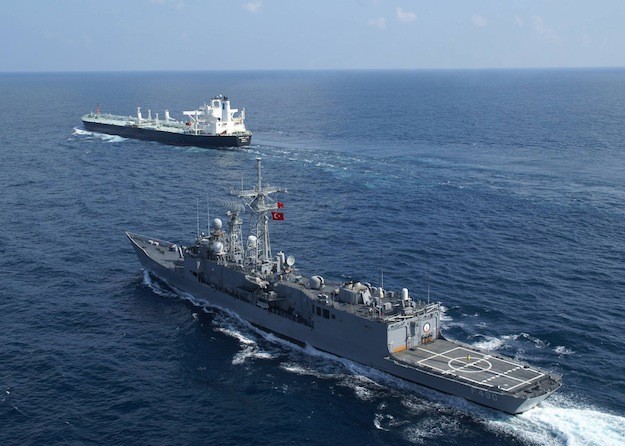Piracy Reporting Centre: Singapore Straits Emerge as Piracy Hotspot
Global piracy and armed robbery incidents against ships have risen sharply in the first quarter of 2025, with a notable 35% increase compared to the same period last year. The...

File photo of NATO’s counter-piracy campaign, Operation Ocean Shield. Image: NATO
By Adrian Croft
BRUSSELS – Pirate attacks off the coast of Somalia have dropped sharply this year but piracy remains a viable “business model” and could bounce back if international naval forces in the region are cut back, the outgoing commander of the NATO mission said on Monday.
Hijackings of ships in a vast area of the Indian Ocean off Somalia have dropped to seven in the first 11 months of this year compared to 24 in the whole of 2011, although Dutch Commodore Ben Bekkering said 136 hostages were still being held.
In the past six months, there has been no successful hijacking of a merchant vessel off Somalia, said Bekkering, who has handed over command of NATO’s Ocean Shield anti-piracy force to Italian Rear-Admiral Antonio Natale.
Pirates operating from the Somali coast have raked in hundreds of millions of dollars in ransoms from hijacking ships, leading NATO, the European Union and other nations to dispatch warships to patrol the area.
Merchant ships responded with tighter security measures, including greater use of private armed security guards.
Bekkering attributed the decline in piracy to the naval patrols, the heightened security on the merchant ships, putting suspected pirates on trial outside Somalia and the Somali authorities’ counter-piracy campaigns.
Some pirates had abandoned their camps, seeing them as too risky, and taken refuge in villages, he said.
But the gains in fighting piracy were reversible if the world’s navies eased up on their efforts, he said.
“I am convinced, if navy ships would disappear, the piracy model would still be intact,” he told a news conference.
“Yes, they don’t deploy that much to sea but the leadership of the piracy is still there and if they hold their breath for a little while and nations (take) their navy ships back, I am pretty sure that the business model is still intact.”
HOSTAGES
The financial crisis has led many Western countries to slash their defense budgets, but Bekkering said he saw no sign NATO nations’ commitment to the anti-piracy operation was waning.
In March, the alliance extended its counter-piracy mission until the end of 2014.
Bekkering said about 16 to 18 ships from all international forces were on patrol in the Indian Ocean at any one time and this was the “bare minimum” needed to patrol such a vast area.
Pirates are still holding five ships with 136 hostages of various nationalities, Bekkering said, but he said he did not expect international forces to adopt a more aggressive policy to trying to free them.
“It is not something that you can take easily. There are so many parties involved in doing a thing like that. There is the flag state (of the ship), the crew members are often of four or five nationalities, there is the cargo and the people who are shipping the cargo also have something to say,” he said.
Bekkering said NATO’s tactic of patrolling close to the Somali coast to deter pirates from putting to sea had been successful but he would not go so far as to say the pirates were “boxed in”.
“There will always be the chance for pirates to deploy. I will not say that we have a fail-safe net around Somalia at the moment,” he said, stressing the importance of maritime patrol aircraft to the operation as NATO’s “eyes from the sky”. (Editing by Alison Williams)
© 2012 Thomson Reuters.

Sign up for gCaptain’s newsletter and never miss an update

Subscribe to gCaptain Daily and stay informed with the latest global maritime and offshore news


Stay informed with the latest maritime and offshore news, delivered daily straight to your inbox
Essential news coupled with the finest maritime content sourced from across the globe.
Sign Up